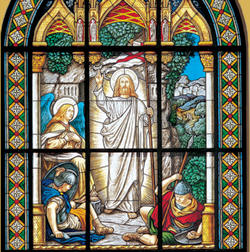
 ID YOU EVER THROW a party? I mean a really big party. How much time did you spend preparing for it? It’s not uncommon for people to start a few days early. Early in the week, you do the shopping, then you clean the house, and you might even do some of the cooking the night before. By the time everything’s ready, it’s fairly easy to spend more time preparing for the feast than actually enjoying it.
ID YOU EVER THROW a party? I mean a really big party. How much time did you spend preparing for it? It’s not uncommon for people to start a few days early. Early in the week, you do the shopping, then you clean the house, and you might even do some of the cooking the night before. By the time everything’s ready, it’s fairly easy to spend more time preparing for the feast than actually enjoying it.
One of the things I love about being Catholic is that we don’t do that. When we have a feast (and the Church has lots of them) we do it right. Take Easter, for example. We prepare for Easter with 40 days of Lent, but then we celebrate Easter for a full 50 days—ten days more than we spent preparing! For this reason, even though we’re six weeks beyond the Easter Vigil at this point, it is still perfectly appropriate to greet one another with “Happy Easter.”
Perhaps you know that one of the hallmarks of the Roman Rite is its changeable Preface to the Eucharistic Prayer. I’ve been transfixed this Easter season, however, by the similarity of the Easter Prefaces. In the opening line of each, the priest prays the same words: “It is truly right and just, our duty and our salvation, at all times to acclaim You, O Lord, but in this time above all to laud You yet more gloriously, when Christ our Passover has been sacrificed.”
This is a daring statement. It claims that during Easter, “in this time above all,” we are supposed to praise God even more gloriously than we do the rest of the year. Why? Because of the enormity of the Paschal Mystery we are celebrating.
The Passion, Death, & Resurrection of Christ is more wondrous than any of the other things we celebrate as a Church. The Easter Mystery is more wondrous than Christmas or the Annunciation or the feast of the Archangels. It’s the most wondrous of all the mysteries, and, because the mystery we’re celebrating is more wondrous, our celebration must be more festive. We sing “All Glory, Laud, and Honor” on Palm Sunday, but we owe the Lord even greater laud throughout Paschaltide.
Lent is long, because we need an annual period of prayer & fasting & retreat. But Easter is longer, because we need that amount of time to do justice to what we celebrate. We’re not celebrating a good report card or a promotion at work or a World Series victory. We’re celebrating the triumph of Jesus Christ over the grave! Are we really still celebrating, or has the enormity of Easter passed us by?

